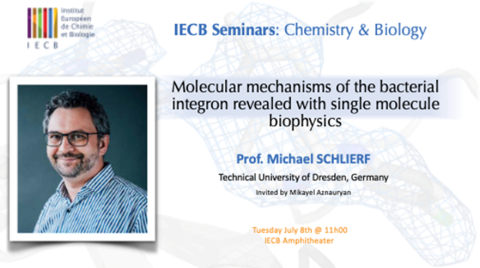
Michael SCHLIERF de l'Université technique de Dresde (Allemagne) présentera un séminaire intitulé : "Molecular mechanisms of the bacterial integron revealed with single molecule biophysics"
Abstract
The predominant tool for adaptation in Gram-negative bacteria is a genetic system called integron. It rearranges gene cassettes promoting multiple antibiotic resistances a recognized major global health threat. It is based on a unique recombination process involving a Tyrosine recombinase - called integrase IntI - and folded single-stranded DNA hairpins - called attC sites. Hundreds of different attC sites can be recombined by IntI yet it is still elusive how the recombinase recognizes the correct DNA hairpin and how the hairpin affects recombination efficiency. In this presentation I will introduce how we use single-molecule FRET and single-molecule forces spectroscopy to study molecular mechanisms encoded in DNA sequence and proteins. I will discuss how different proteins compete for the identical single-stranded DNA and how naturally occurring sequences within the attC sites are optimized for genetic stability. I will also discuss how the attC sequence potentially regulates choice of DNA strand by slightly adjusted structures. We further developed an optical tweezers force-spectroscopy assay that allows us to probe the synaptic complex stability for different DNA substrates and protein variants. I will discuss what DNA and protein elements regulate the stability of the macromolecular complex and how this could in turn regulate the recombination efficiency. With the acquired insights we aim to design a component that would actively destabilize a given synaptic complex by extension inhibiting the spread of antibiotic resistances.
Contact
- Mikayel Aznauryan, chargé de recherche Inserm, ARNA


